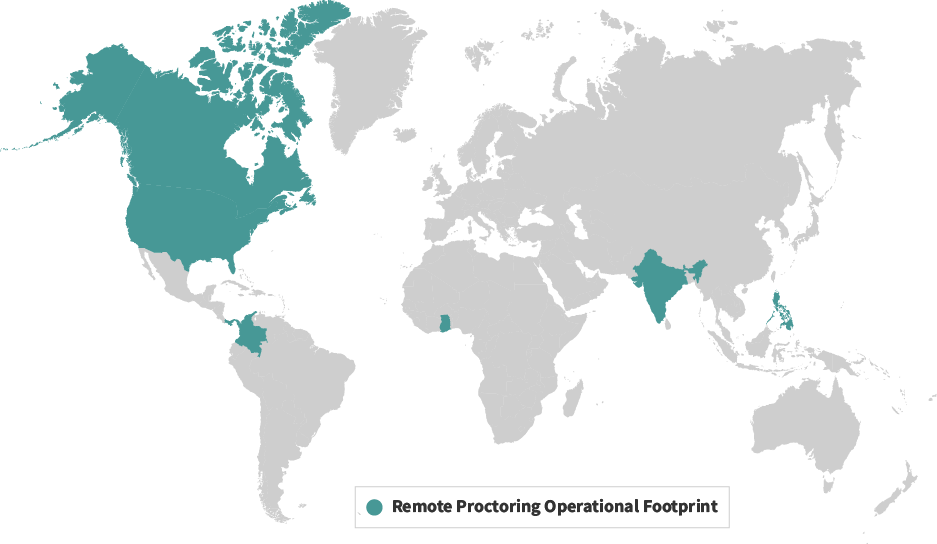In the second installment of our series exploring Meazure Learning’s approach to proctoring, we’re focusing on the operational aspects that help us meet the diverse needs of clients and test-takers worldwide. This article addresses common questions about our proctoring operations, capacity, ratios, and unique team structure. To answer these questions, we’ve brought in Steve Morgan, our Senior Vice President of Proctor Operations. Steve has been with the company since 2013 and oversees all aspects of our proctoring services to ensure exam integrity and a high-quality testing experience.
Can you explain how Meazure Learning’s operational infrastructure supports its proctoring services?
Absolutely! We employ thousands of people across multiple global proctoring centers. This decentralized model helps us provide consistent and reliable service worldwide. For example, if one of our proctoring operating centers is disrupted by a power outage, the others are prepared to take over. Our extensive operational footprint also allows us to respond quickly to local challenges and meet the needs of our global clients with unparalleled proctoring service quality.

Explore More in This Series
What elements do you focus on to maintain proctoring service quality at scale?
There are several key elements to maintaining a balance between scalability and integrity. The first is our human-centered proctoring approach: We rely on highly trained proctors to watch every minute of synchronous exams and professional reviewers to audit every minute of asynchronous sessions. We also continually invest in the technology behind our proctoring platform, which is designed to handle high exam volumes simultaneously, and our proprietary secure browser, which prevents misconduct by “locking down” the virtual testing environment according to client specifications.
The other element is our team structure: Our proctoring and support staff have distinct roles tailored to their areas of expertise. This differentiation allows them to excel in their specific functions, ultimately leading to a more secure, personalized, and efficient testing experience.
Can you describe those specialized roles in more detail and explain how they affect the ratio between proctors and test-takers?
While we focus on keeping our ratios low, we feel strongly that the most important question is about the quality of our service. We never lose sight of the ultimate outcome our clients seek: a high-quality experience for their test-takers and security for their exam content.
As I mentioned before, this includes having specialized roles within our proctoring team. These roles allow us to deliver a smooth experience for test-takers along with additional oversight when needed. The roles include:
- Launchers: These folks are qualified proctors who may assist test-takers through the exam launch process. They help with ID verification and session launch, and they also answer any questions about the exam rules. Launchers remain with test-takers until the first question of the exam, and then they transition control to live session proctors.
- Proctors: The sole focus of our proctors is to monitor exam sessions. That’s it. Other proctoring providers may assign additional duties—like tech support or conflict resolution—to their proctors, require them to work at a high ratio, or have them just “pop in” to session instead of stay focused throughout. However, we believe this approach reduces the proctors’ ability to respond to session events.
- Intervention specialists: This role is comprised of our most experienced proctors who have extensive training in handling exam rule violations. Proctors can invite an intervention specialist to any session where irregularities are occurring or if they feel there is a potential risk. This means that active security issues are escalated to a specialist so the proctor can continue monitoring other test-takers.
- Technicians and support staff: We have two specialized support roles that handle technical issues. Support representatives respond to issues before or after an exam session, while service delivery technicians deal with active session issues.
So, to answer your question about ratios: When test-takers are going through the exam launch process, the ratio is 1:1. Once they enter an exam, the ratio can go up to 4:1. However, if a proctor identifies any suspicious behavior, the test-taker will be transferred to an intervention specialist, which is a 1:1 interaction.
What is the system’s capacity for remote proctoring sessions?

Over the last several years, we’ve expanded our capacity, ensuring that over 90% of test-takers can find an appointment within their preferred hour of their preferred day. With enough notice, our system can scale up to more than 30,000 exams per day on the Live+ and Review+ service lines. For Record+ exams, we have unlimited capacity.
How do you prepare your proctors for the complexities of remote proctoring?
Training is the cornerstone of effective proctoring; it’s what separates good proctors from great ones. Anyone can sit in a room and watch someone take an exam. A great proctor knows what to look for, when to escalate an incident, how to accommodate diverse testing needs, and how to communicate effectively and empathetically with test-takers.
Our proctor training program is rigorous and comprehensive. It includes:
- Intensive onboarding training: This phase includes in-depth lessons on compliance and privacy, ensuring candidates understand the broader implications of their prospective role
- Weeks of supervised proctoring: Our certified proctor managers closely monitor all proctor candidates, providing real-time feedback and guidance. This hands-on experience helps candidates apply their theoretical knowledge to real proctoring scenarios.
- Proctor certification exams: This phase includes a performance review and series of exams that test candidates’ knowledge of:
- Our proctoring system, policies, and processes
- Their command of the English language
- Their understanding of privacy laws and procedural integrity
- Ongoing training: After certification, all proctors receive monthly group training, continuous one-on-one coaching, and regular refresher courses to stay updated on the latest developments in the field.
- Blind auditing: Our Compliance team conducts blind audits to ensure all proctors maintain high stands. We initiate immediate corrective training if we detect any issues during these audits.
“Training is the cornerstone of effective proctoring; it’s what separates good proctors from great ones.”
—Steve Morgan, SVP of Proctor Operations, Meazure Learning
How do you think your proctor training and development impacts the overall testing experience?
The quality of our proctors directly impacts the quality of the testing experience—for everyone involved. A positive proctoring experience reflects positively on the test owner and bolsters their reputation. When our proctoring staff is thoroughly trained, they have the technical skills to spot and address security threats as well as the soft skills to provide real-time support and ensure a calm and accommodating testing environment. This combination benefits test-takers of course, but it also goes a long way toward streamlining the process for administrators, faculty members, and program owners. Ultimately, our commitment to proctor training and development means our clients can trust us to deliver a seamless, secure, and supportive testing process.
Looking for More?
Please reach out if you have any proctoring questions that weren’t answered in this article.
Contact Us